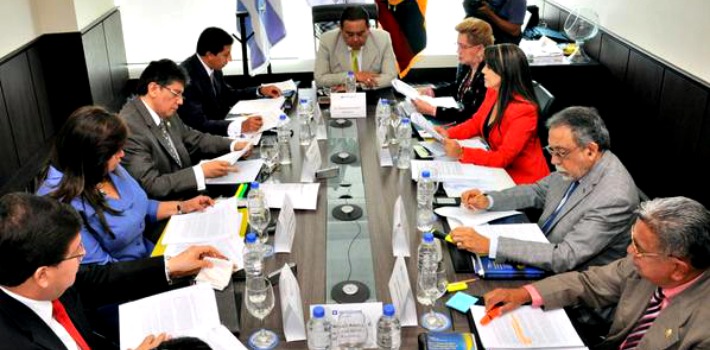
EspañolEcuador’s central government moved one step closer to achieving its goal of unlimited reelection for public officials on Friday. The Constitutional Court unanimously surrendered determination of the issue to a majority vote in the National Assembly.
The decision is a setback for the opposition, given their request that the amendment be decided by a popular referendum. With the decision in the hands of the Ecuadorean Congress, it becomes highly likely that President Rafael Correa will remain in power beyond the end of his current term in 2017.
Unlimited reelection is one of 17 reforms submitted by assembly members to the Constitutional Court for review. Among these is the conversion of social communication into a public service, the empowerment of the Armed Forces to support the police in domestic security, and a modification of the age limit necessary to run for president.
‘The Constitutional Court has just ruled that amendments can now be addressed by the Legislative Assembly and approved by a two thirds majority,” explained Correa during his Citizen Link program, broadcast every Saturday on both radio and television.
The court justices arrived at their decision after two days of debate and legal analysis in the coastal city of Guayaquil. The only amendment not to pass for congressional approval was the “protective action” provision, which would remove a legal remedy for protection from state persecution (PDF). It alone requires a special constitutional assembly for implementation and cannot be passed by the National Assembly.
“We present the country with our decision, absolutely convinced that it has been the object of analysis, reasoning, and argument … which correspond to regulations, studies, and analysis of convention [which] ultimately seek to guarantee and protect the citizens of the country,” the court declared in a press release.
Pleno de la @CCE_ECU resuelve la propuesta de reforma a la constitución presentada por asambleístas. #Guayaquil pic.twitter.com/iUg16T32uE
— Corte Constitucional (@CorteConstEcu) October 31, 2014
As to the possibility that Correa will run for reelection in 2017, the president has said that he will only do so if the continuity of the country’s “citizen revolution” is threatened. He notes that the power remains in the hands of the voters.
“What is at stake is the people’s right to choose between the hunger and misery of the neoliberal past, and the future of well-being, development, and inclusion established by the citizen revolution,” said Doris Soliz Carrión, national executive secretary of the PAIS Alliance Party.
Opposition Won’t Let Go of Constituent Referendum
Days before the Constitutional Court arrived at its decision, the political opposition worked to collect signatures requesting that any constitutional amendment be deliberated on by a popular, nation-wide referendum.
Guillermo Lasso, a banker and former presidential candidate, leads this initiative. He is a member of Creating Opportunities (CREO), a liberal movement and secondary political force in the country. Lasso has declared that he will demand the necessary paperwork from the National Electoral Council to begin collecting signatures.
“The Constitutional Court has once again become the legal and political arm of the regime. This decision consolidates the position of the regime to insure that unlimited reelection happens within the four walls [of congress],” claims CREO representative Luis Fernando Torres.
Chávez’s Shadow over the Region
At present, the Ecuadorean Constitution allows for immediate presidential reelection for one term. If the new amendment is approved by the National Assembly, Ecuador will join Venezuela, Bolivia, and other countries that allow for unlimited reelection of government officials.
Venezuela has had indefinite reelection since Hugo Chávez managed to pass a constitutional amendment in 2009, with 54 percent of the vote. Bolivia followed, also in 2009, with a constitutional convention and the same outcome. Doctor Mario Serrafero, professor of institutional analysis at ESEADE University in Buenos Aires, also wrote in a 2011 essay that Hugo Chavez’s influence proved instrumental in the election of Bolivian President Evo Morales in 2005 and Ecuadorean President Rafael Correa in 2006.
Translated by Peter Sacco. Edited by Fergus Hodgson.
 Versión Español
Versión Español












